- Home
- Ken Follett
World Without End Page 33
World Without End Read online
Page 33
At last he stood up. His heart was full of elation, but he kept his face straight. He held up his hands for quiet. Then, when the room was silent, he said in a low, modest voice: "I shall obey the will of my brethren."
The room erupted in cheering.
23
Godwyn delayed the election. Earl Roland was going to be angry at the result, and Godwyn wanted to give him as little time as possible to fight the decision before the wedding.
The truth was that Godwyn was frightened. He was going up against one of the most powerful men in the kingdom. There were only thirteen earls. Together with about forty lesser barons, twenty-one bishops, and a handful of others, they governed England. When the king summoned Parliament, they were the Lords, the aristocratic group, by contrast with the Commons, who were knights, gentry, and merchants. The earl of Shiring was one of the more powerful and prominent men of his class. And yet Brother Godwyn, age thirty-one, son of the widow Petranilla, who had risen no higher than sacrist of Kingsbridge Priory, was in conflict with the earl--and, what was even more dangerous, he was winning.
So he dithered--but, six days before the wedding, Roland put his foot down and said: "Tomorrow!"
Guests were already arriving for the nuptials. The earl of Monmouth had moved into the hospital, using the private room next to Roland's. Lord William and Lady Philippa had had to remove to the Bell Inn. Bishop Richard was sharing the prior's house with Carlus. Lesser barons and knights filled the taverns, along with their wives and children, squires and servants and horses. The town enjoyed a surge of spending, much needed after the disappointing profits from the rain-drenched Fleece Fair.
On the morning of the election Godwyn and Simeon went to the treasury, a small windowless room behind a heavy oak door off the library. The precious ornaments used for special services were there, locked in an ironbound chest. Simeon as treasurer held the keys.
The election was a foregone conclusion, or so thought everyone except Earl Roland. No one suspected Godwyn's hidden hand. He had suffered one tense moment, when Thomas had wondered aloud how Friar Murdo got to know about the Isabella charter. "He can't have discovered it accidentally--he's never been seen reading in the library, and anyway that deed isn't kept with the others," Thomas had said to Godwyn. "Someone must have told him about it. But who? Only Carlus and Simeon knew of it. Why would they have let the secret out? They didn't want to help Murdo." Godwyn had said nothing, and Thomas had remained baffled.
Godwyn and Simeon dragged the treasure chest into the light of the library. The cathedral jewels were wrapped in blue cloth and cushioned in protective sheets of leather. As they sorted through the box, Simeon unwrapped some of the items, admiring them and checking that they were undamaged. There was a plaque a few inches wide made of ivory, delicately carved, showing the crucifixion of St. Adolphus, at which the saint had asked God to grant good health and long life to all those who venerated his memory. There were numerous candlesticks and crucifixes, all of gold or silver, most decorated with precious stones. In the strong light from the tall library windows the gems glittered and the gold glowed. These things had been given to the priory, over the centuries, by devout worshippers. Their combined value was awesome: there was more wealth here than most people ever saw in one place.
Godwyn had come for a ceremonial crosier, or shepherd's crook, made of wood encased in gold, with an elaborately jeweled handle. This was ritually handed to the new prior at the end of the election process. The crook was at the bottom of the chest, not having been used for thirteen years. As Godwyn drew it out, Simeon let out an exclamation.
Godwyn looked up sharply. Simeon was holding a large crucifix on a stand, intended to be placed on an altar. "What's the matter?" Godwyn said.
Simeon showed him the back of the cross and pointed to a shallow cup-shaped indentation just below the crosspiece. Godwyn immediately saw that a ruby was missing. "It must have fallen out," he said. He glanced around the library: they were alone.
They were both worried. As treasurer and sacrist they shared responsibility. They would be blamed for any loss.
Together they examined every item in the chest. They unwrapped each one and shook out every blue cloth. They looked at all the leather sheets. Frantically, they scrutinized the empty box and the floor all around. The ruby was nowhere to be seen.
Simeon said: "When was the crucifix last used?"
"At the feast of St. Adolphus, when Carlus fell. He knocked it off the table."
"Perhaps the ruby fell out then. But how is it possible that no one noticed?"
"The stone was on the back of the cross. But surely someone would have seen it on the floor?"
"Who picked up the crucifix?"
"I don't remember," Godwyn said quickly. "The situation was confused." In fact he remembered perfectly well.
It was Philemon.
Godwyn could picture the scene. Philemon and Otho together had righted the altar, setting it squarely on its platform. Then Otho had picked up the candlesticks and Philemon the cross.
With a growing feeling of dismay, Godwyn recalled the disappearance of Lady Philippa's bracelet. Had Philemon stolen again? He trembled to think how it might affect him. Everyone knew that Philemon was Godwyn's unofficial acolyte. Such a dreadful sin--stealing a jewel from a sacred ornament--would bring shame on everyone associated with the perpetrator. It could easily upset the election.
Simeon obviously did not recollect the scene exactly, and he accepted without question Godwyn's feigned inability to remember who had picked up the cross. But others among the monks would surely recall seeing it in Philemon's hands. Godwyn had to put this right quickly, before suspicion could fall on Philemon. But first he had to get Simeon out of the way.
"We must search for the ruby in the church," Simeon said.
"But the service was two weeks ago," Godwyn protested. "A ruby can't have lain on the floor unnoticed for that length of time."
"It's unlikely, but we must check."
Godwyn saw that he had to go with Simeon, and wait for an opportunity to get away from him and seek out Philemon. "Of course," he said.
They put the ornaments away and locked the treasury door. As they left the library, Godwyn said: "I suggest we say nothing about this until we're sure the jewel has been lost. No point in bringing blame on our heads prematurely."
"Agreed."
They hurried around the cloisters and entered the church. They stood in the center of the crossing and scanned the ground all around them. A month ago, the idea that a ruby could lie hidden somewhere on the church floor would have been more plausible; but recently the flagstones had been repaired, and the cracks and chips had disappeared. A ruby would have stood out.
Simeon said: "Now that I come to think of it, wasn't it Philemon who picked up the crucifix?"
Godwyn looked at Simeon's face. Was there accusation in the expression? He could not tell. "It may have been Philemon," Godwyn said. Then he saw a chance to get away. "I'll go and fetch him," he suggested. "Perhaps he will be able to recall exactly where he was standing at the time."
"Good idea. I'll wait here." Simeon got down on his knees and began to pat the floor with his hands, as if the ruby might be found by touch more easily than by sight.
Godwyn hurried out. He went first to the dormitory. The blanket cupboard was in the same place. He pulled it away from the wall, found the loose stone, and removed it. He put his hand into the hidey-hole where Philemon had stashed Lady Philippa's bracelet.
He found nothing there.
He cursed. It was not going to be that easy.
I'll have to dismiss Philemon from the monastery, he thought as he strode through the priory buildings looking for him. If he has stolen this ruby, I can't cover up for him again. He's out.
Then he realized, with a shock of dismay, that he could not dismiss Philemon--not now, perhaps not ever. It was Philemon who had told Friar Murdo about the Isabella charter. If dismissed, Philemon could confess what he had done, a
nd reveal that he had done it at Godwyn's instigation. And he would be believed. Godwyn recalled Thomas's puzzling over who had told Murdo the secret, and why. Philemon's revelation would gain conviction by answering that question.
There would be an outcry at such underhand work. Even if the disclosure were made after the election, it would undermine Godwyn's authority and cripple his ability to lead the monks. The ominous truth dawned on him that he now had to protect Philemon in order to protect himself.
He found Philemon sweeping the hospital floor. He beckoned him outside and led him around to the back of the kitchen, where it was unlikely that anyone would see them.
He looked Philemon in the eye and said: "There's a ruby missing."
Philemon looked away. "How terrible."
"It's from the altar crucifix that was knocked to the floor when Carlus fell over."
Philemon pretended innocence. "How could it have gone missing?"
"The ruby may have become dislodged when the crucifix hit the floor. But it's not on the floor now--I've just looked. Someone found it--and kept it."
"Surely not."
Godwyn felt angered by Philemon's false air of innocence. "You fool, everyone saw you pick up that crucifix!"
Philemon's voice rose to a higher pitch. "I know nothing about it!"
"Don't waste time lying to me! We have to put this right. I could lose the election on your account." Godwyn pushed Philemon up against the wall of the bakehouse. "Where is it?"
To his astonishment, Philemon began to cry.
"For the love of the saints," Godwyn said disgustedly. "Stop this nonsense--you're a grown man!"
Philemon continued to sob. "I'm sorry," he said. "I'm sorry."
"If you don't stop that--" Godwyn checked himself. Nothing was to be gained by berating Philemon. The man was truly pathetic. Speaking more gently, he said: "Try to pull yourself together. Where is the ruby?"
"I hid it."
"Yes..."
"In the refectory chimney."
Godwyn immediately turned away, heading for the refectory. "Mary save us, it could fall into the fire!"
Philemon followed, his tears drying. "There's no fire in August. I would have moved it before the cold weather."
They entered the refectory. At one end of the long room was a wide fireplace. Philemon put his arm up the chimney and fumbled for a moment. Then he produced a ruby the size of a sparrow's egg, covered with soot. He wiped it clean on his sleeve.
Godwyn took it. "Now come with me," he said.
"What are we going to do?"
"Simeon is going to find this."
They went to the church. Simeon was still searching on hands and knees. "Now," Godwyn said to Philemon. "Try to remember exactly where you were when you picked up the crucifix."
Simeon looked at Philemon and, seeing signs of emotion on his face, spoke kindly to him. "Don't be afraid, lad, you've done nothing wrong."
Philemon positioned himself on the east side of the crossing, close to the steps leading up to the chancel. "I think it was here," he said.
Godwyn climbed the two steps and looked under the choir stalls, pretending to search. Surreptitiously, he placed the ruby under one of the rows of seats, close to the near end, where it was not visible to a casual glance. Then, as if changing his mind about the likeliest place to look, he moved to the south side of the chancel. "Come and search under here, Philemon," he said.
As he had hoped, Simeon then moved to the north side and got down on his knees to look under the stalls, murmuring a prayer as he did so.
Godwyn expected Simeon to see the ruby immediately. He pretended to search the south aisle, waiting for Simeon to find it. He began to think there must be something wrong with Simeon's eyesight. He might have to go over there and "find" it himself. Then at last Simeon called out: "Oh! Here!"
Godwyn pretended to be excited. "Have you found it?"
"Yes! Hallelujah!"
"Where was it?"
"Here--under the choir stalls!"
"Praise be to God," said Godwyn.
Godwyn told himself not to be frightened of Earl Roland. As he climbed the stone stairs of the hospital to the guest rooms, he asked himself what the earl could do to him. Even if Roland had been capable of getting out of his bed and drawing a sword, he would not be foolish enough to attack a monk within the precincts of a monastery--even a king would hardly get away with that.
Ralph Fitzgerald announced him, and he went into the room.
The earl's sons stood either side of the bed: tall William, in soldierly brown hose and muddy boots, his hair already receding from his forehead; and Richard, in bishop's purple, his growing roundness of figure evidence of a sybaritic nature and the means to indulge it. William was thirty, a year younger than Godwyn; he had his father's strength of will, but it was sometimes softened by the influence of his wife, Philippa. Richard was twenty-eight, and presumably took after his late mother, for he had little of the earl's imposing bearing and forcefulness.
"Well, monk?" said the earl, speaking out of the left side of his mouth. "Have you held your little election?"
Godwyn suffered a moment of resentment for this discourteous form of address. One day, he vowed silently, Roland would call him Father Prior. Indignation gave him the courage he needed to tell the earl the news. "We have, Lord," he said. "I have the honor to tell you that the monks of Kingsbridge have chosen me as their prior."
"What?" the earl bellowed. "You?"
Godwyn bowed his head in an affectation of humility. "No one could be more surprised than I."
"You're nothing but a boy!"
The insult stung Godwyn into a rejoinder. "I'm older than your son, the bishop of Kingsbridge."
"How many votes did you get?"
"Twenty-five."
"And how many for Friar Murdo?"
"None. The monks were unanimous--"
"None?" Roland roared. "There must have been a conspiracy--this is treason!"
"The election was held in strict accordance with the rules."
"I don't care a pig's prick for your rules. I won't be ignored by a bunch of effeminate monks."
"I am the choice of my brothers, my lord. The inauguration ceremony will be held this coming Sunday, before the wedding."
"The monks' choice must be ratified by the bishop of Kingsbridge. And I can tell you he will not ratify you. Rerun the election, and this time bring me the result I want."
"Very good, Earl Roland." Godwyn went to the door. He had several more cards in his hand, but he was not going to lay them on the table all at once. He turned and addressed Richard. "My lord bishop, when you wish to speak to me about this, you will find me in the prior's house."
He stepped outside. "You're not the prior!" Roland shouted as he shut the door.
Godwyn was trembling. Roland was formidable, especially when angry, and he was often angry. But Godwyn had stood his ground. Petranilla would be proud of him.
He went down the stairs on shaky legs and made his way to the prior's house. Carlus had already moved out. For the first time in fifteen years, Godwyn would have a bedroom to himself. His pleasure was only slightly damped by having to share the place with the bishop, who traditionally stayed there while visiting. The bishop was, technically, the abbot of Kingsbridge ex officio and, though his power was limited, his status was above that of the prior. Richard was rarely in the house during the day, but returned every night to sleep in the best bedroom.
Godwyn entered the ground-floor hall and sat in the big chair, waiting. It would not be long before Bishop Richard appeared, his ears burning with his father's scorching instructions. Richard was a rich and powerful man, but not frightening in the way the earl was. All the same, it was a bold monk who defied his bishop. However, Godwyn had an advantage in this confrontation, for he knew something shameful about Richard, and that was as good as a knife up his sleeve.
Richard bustled in a few minutes later, showing a confidence that Godwyn knew to be faked. "I'v
e struck a bargain for you," he said without preamble. "You can be subprior under Murdo. You'll be in charge of day-to-day management of the priory. Murdo doesn't want to be an administrator, anyway--he just wants the prestige. You'll have all the power, but my father will be satisfied."
"Let me get this straight," said Godwyn. "Murdo agrees to make me his subprior. Then we tell the rest of the monks that he is the only one you'll ratify. And you think they will accept that."
"They have no choice!"
"I have an alternative suggestion. Tell the earl that the monks will not have anyone but me--and that I must be ratified before the wedding, otherwise the monks will not take part in the nuptials. The nuns, too, will refuse." Godwyn did not know whether the monks would go along with this--let alone Mother Cecilia and the nuns--but he was too far gone for caution.
"They wouldn't dare!"
"I'm afraid they would."
Richard looked panicky. "My father won't be bullied!"
Godwyn laughed. "Small chance of that. But I hope he may be made to see reason."
"He'll say the wedding must go ahead anyway. I'm the bishop, I can marry the couple, I don't need monks to help me."
"Of course. But there will be no singing, no candles, no psalms, no incense--just you and Archdeacon Lloyd."
"They will still be married."
"How will the earl of Monmouth feel about such a mean wedding for his son?"
"He'll be furious, but he'll accept it. The alliance is the important thing."
That was probably right, Godwyn thought, and he felt the cold draft of imminent failure.
It was time to draw his concealed knife.
"You owe me a kindness," he said.
At first, Richard pretended not to know what he was talking about. "Do I?"
"I concealed a sin you committed. Don't pretend to have forgotten, it was only a couple of months ago."
"Ah, yes, that was generous of you."
"I saw, with my own eyes, you and Margery on the bed in the guest room."
"Hush, for pity's sake!"
"Now is your chance to repay me that kindness. Intercede with your father. Tell him to give in. Argue that the wedding is more important. Insist on ratifying me."

 The Pillars of the Earth
The Pillars of the Earth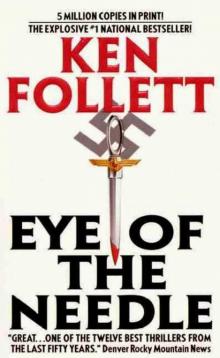 Eye Of The Needle
Eye Of The Needle Lie Down With Lions
Lie Down With Lions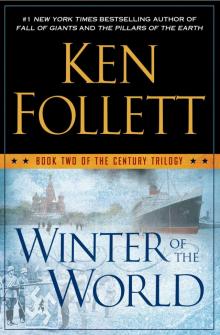 Winter of the World
Winter of the World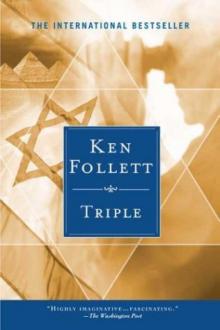 Triple
Triple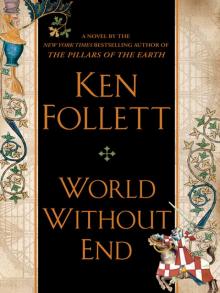 World Without End
World Without End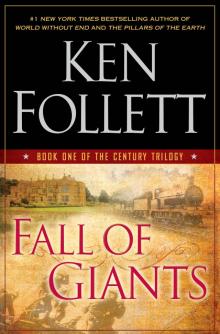 Fall of Giants
Fall of Giants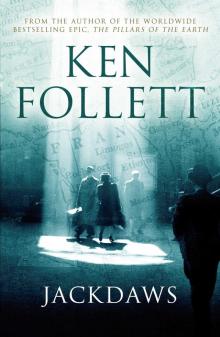 Jackdaws
Jackdaws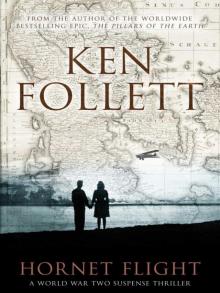 Hornet Flight
Hornet Flight Whiteout
Whiteout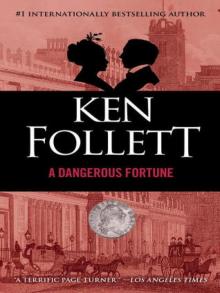 A Dangerous Fortune
A Dangerous Fortune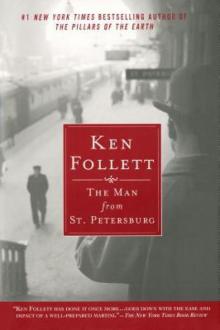 The Man From St. Petersburg
The Man From St. Petersburg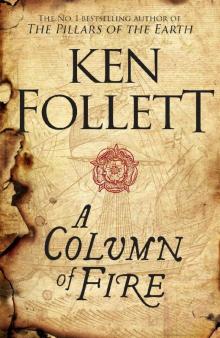 A Column of Fire
A Column of Fire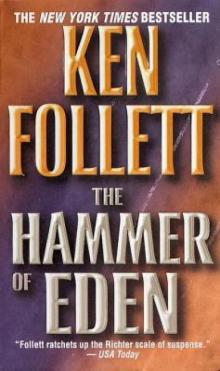 The Hammer of Eden
The Hammer of Eden On Wings of Eagles
On Wings of Eagles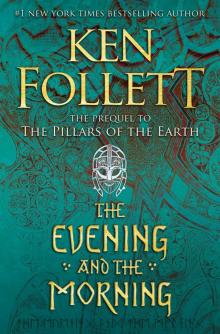 The Evening and the Morning
The Evening and the Morning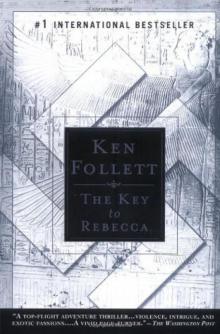 The Key to Rebecca
The Key to Rebecca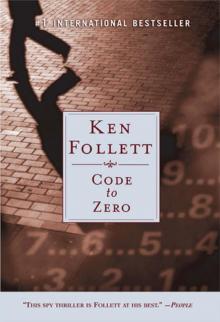 Code to Zero
Code to Zero Paper Money
Paper Money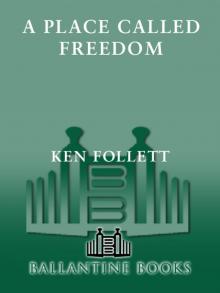 A Place Called Freedom
A Place Called Freedom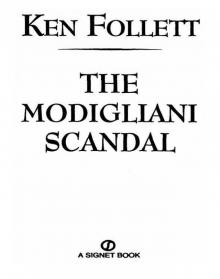 The Modigliani Scandal
The Modigliani Scandal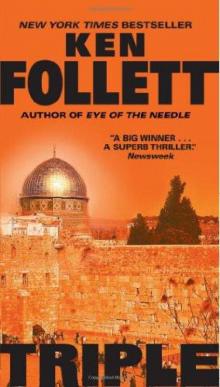 Triple (1991)
Triple (1991)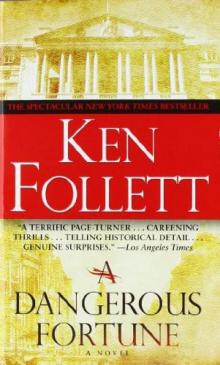 A Dangerous Fortune (1994)
A Dangerous Fortune (1994)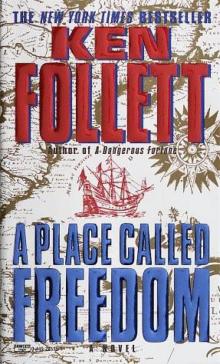 A Place Called Freedom (1995)
A Place Called Freedom (1995)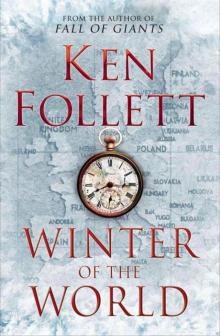 Winter of the World (Century Trilogy 2)
Winter of the World (Century Trilogy 2)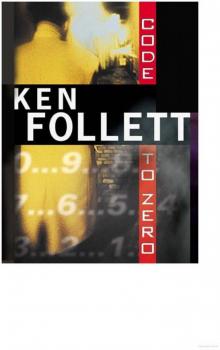 Code to Zero (2000)
Code to Zero (2000) On Wings Of Eagles (1990)
On Wings Of Eagles (1990) Storm Island
Storm Island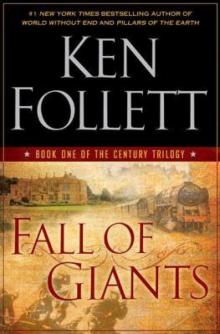 Fall of Giants (The Century Trilogy)
Fall of Giants (The Century Trilogy)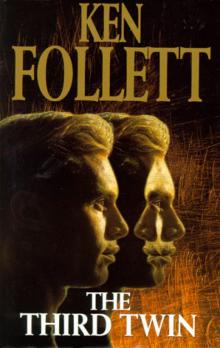 the Third Twin (1996)
the Third Twin (1996)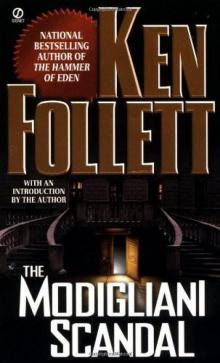 The Modigliani Scandal (1976)
The Modigliani Scandal (1976)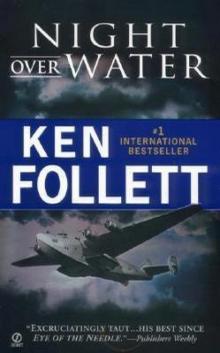 Night Over Water
Night Over Water